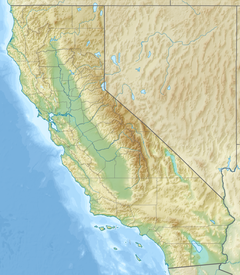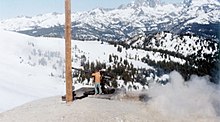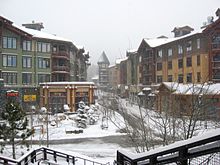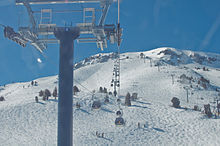| Mammoth Mountain | |
|---|---|
 Wipeout Chutes under Chair 23 Wipeout Chutes under Chair 23with The Minarets of the Ritter Range | |
  | |
| Location | Mammoth Mountain Sierra Nevada Mono & Madera Counties, California |
| Nearest major city | Mammoth Lakes, California |
| Coordinates | 37°37′50″N 119°01′57″W / 37.63056°N 119.03250°W / 37.63056; -119.03250 |
| Status | Operating |
| Owner | Alterra Mountain Company |
| Vertical | 3,100 ft (940 m) |
| Top elevation | 11,053 ft (3,369 m) |
| Base elevation | 7,953 ft (2,424 m) at Eagle Lodge |
| Skiable area | 3,500 acres (1,420 ha) |
| Trails | 175 named |
| Longest run | 3 mi (4.8 km) |
| Lift system | 25 lifts: 3 gondolas, 19 chairs (2 high speed six-packs, 10 high speed quads, 1 quad, 6 triple, 3 double), 3 surface lifts |
| Lift capacity | 59,000 passengers/hr |
| Terrain parks | Disco Playground, Wonderland Playground, X-Course, Forest Trail Park, Jibs Galore, Transition Park, South Park, Main Park |
| Snowfall | 400 in (1,020 cm) |
| Snowmaking | Yes, 700 acres (280 ha) covering 81 trails |
| Night skiing | No |
| Website | mammothmountain.com |
Mammoth Mountain Ski Area is a large ski resort in the western United States, located in eastern California along the east side of the Sierra Nevada mountain range in the Inyo National Forest.
Mammoth has more than 3,500 acres (1,420 ha) of skiable terrain, serviced by 28 lifts. The area has 3,100 ft (940 m) of vertical, rising to an elevation of 11,059 ft (3,371 m), and enjoys a long ski season. The resort was founded in 1953 by Dave McCoy and, from 2005 to 2017, was owned by the Starwood Capital Group under the entity Mammoth Resorts. Mammoth Resorts also operated June Mountain, Bear Mountain, and Snow Summit.
In 2017, Mammoth Resorts announced its sale by Starwood to a partnership of Aspen Skiing Company and KSL Capital Partners, later named Alterra Mountain Company.
Description
The ski area is located on the north side of Mammoth Mountain in the volcanic Long Valley Caldera. Overnight guests stay in the town of Mammoth Lakes, California, and occasionally in neighboring towns such as Bishop and June Lake. June Lake's ski area, June Mountain is also owned by Alterra Mountain Company. The top of the mountain has challenging chutes and groomed as well as mogul runs. There are eight Unbound terrain parks. Unbound Main, adjacent to Main Lodge, is highly praised by extreme snowboarding and skiing enthusiasts, and is one of the major attractions of the ski resort.
Mammoth Mountain also has one of the longest ski seasons in North America, which averages from the start of November to Memorial Day. The resort occasionally enjoys a longer season, as in 2016/2017, when it opened on November 8 and did not close until August 6th. The 1994–95 season was Mammoth Mountain's longest, with the resort operating over ten months from October 8 until August 13. The 2016–2017 season was the third snowiest on record, with 618 inches (2010–2011 with 668.5 inches was the second snowiest, and the 2022–2023 season total holds the record with 715 inches at the main lodge, and nearly 900 inches at the summit). January 2017 was the snowiest month in Mammoth history, with 246 inches. Mammoth receives an average of 322 inches (820 cm) of snow per season.
As recently as the 1980s, senior citizens could ski on Mammoth for free. As of 2006, those aged at least 80 years may ski for free.

Terrain aspects
- North: 65%
- West: 10%
- East: 22%
- South: 3%
Logistics
Mammoth Mountain is located in California's Eastern Sierra approximately 100 mi (160 km) south of the Nevada state line and 50 minutes from the Eastern Gate of Yosemite National Park. While the ski area is located in central California, it is mainly frequented by skiers and snowboarders from southern California. Although it is a five-hour drive from Los Angeles via U.S. 395, it is much closer for southern California winter sports enthusiasts than the Lake Tahoe area resorts, which are more accessible to the San Francisco Bay Area. Mammoth Mountain is a more popular destination than southern California ski resorts in the San Bernardino and San Gabriel Mountains, because of these areas' heavy reliance on snowmaking, coupled with significantly lighter winter precipitation and their notably shorter seasons. Although Mammoth is physically closer to San Francisco and central valley cities than Los Angeles, most mountain passes along the Sierra crest are closed after the first major snowfall, and this lack of a trans-Sierra travel route creates an unusually long drive to Mammoth (6–8 hours) from the Bay Area and most of central California. For example: during the summer, the distance from Fresno to Mammoth Lakes is 189 miles (304 km), while in winter it nearly doubles to 366 miles (589 km).
Airline service
In recent years, Mammoth has hosted more visitors from outside of California and Nevada. Scheduled passenger service, as of April 2024, is available to Eastern Sierra Regional Airport (BIH), about 45 min from Mammoth Lakes from San Francisco (SFO) and Denver International Airport (DEN) on a seasonal basis.
History
Mammoth was founded by Dave McCoy, a hydrographer for the Los Angeles Department of Water and Power. As a member of the Eastern Sierra Ski Club in the 1930s, McCoy noticed that Mammoth Mountain consistently held more snow than other mountains. The Ski Club had a portable rope tow. McCoy bought the rope tow from the club in 1941 and usually kept it at Mammoth. In 1953, the United States Forest Service awarded a permit to McCoy to operate the ski area, and the first ski lift was built in 1955.
Incidents
Further information: 2006 Mammoth Mountain Ski Patrol Deaths
As the ski area grew, McCoy faced adverse circumstances: the 1973 oil crisis, an avalanche in 1979 that destroyed a ski lift, and a prolonged drought that led to layoffs in 1991.
Mammoth had a number of associated fatalities in its history:
- In 1973, the resort bought Sierra Pacific Airlines from 3-D film cinematographer Chris Condon. On March 13, 1974, a film crew for Wolper Productions filming a National Geographic history of Australopithecus at the resort was killed when their Convair 440 aircraft (N4819C) flew into a 7,000-foot (2,130 m) ridge shortly after an evening take-off from Eastern Sierra Regional Airport in Bishop, killing all 35 on board including 31 Wolper crew members—although not Wolper himself. The filmed segment was recovered in the wreckage and was broadcast in the television show Primal Man. The National Transportation Safety Board was unable to determine the cause of the accident, and the resort sold the airline. Sierra Pacific previously operated scheduled passenger flights with turboprop aircraft between Mammoth Lakes and Burbank, Fresno, Los Angeles and Las Vegas.

- On April 6, 2006, three ski patrollers at the ski area perished either due to a fall or combination of CO2 and hydrogen sulfide (H2S) poisoning. Both gases are present on a known dangerous fumarole on the mountain and were more concentrated on that day because the fumarole had been covered by snow for days. Four patrollers, including John "Scott" McAndrews and James Juarez, were raising the fence around the fumarole, which had become buried due to heavy snowfall. The fumarole had melted a cavern below the snowbridge which collapsed under James and Scott. The pair of men fell 21 feet (6.4 m) and perished within a matter of minutes. Another ski patroller, Walt Rosenthal, perished in a rescue attempt, which injured seven others. The oxygen masks used by the Mammoth Mountain ski patrol did not properly seal, allowing hazardous gases to come in.
Sale to Intrawest

In January 1996, Intrawest Corporation and Mammoth Mountain Ski area announced that Intrawest Corporation had purchased 33% of Mammoth and June Mountain ski operations, as well as all of the developable real estate owned by Mammoth Mountain Ski Area. In 1998, Intrawest increased their partnership interest to 58%. The development of three new village areas: The Village at Mammoth, Sierra Star, and Juniper Springs, has brought new developments to the resort.
The Village at Mammoth, a European-style and pedestrian-only complex, was built in a style similar to other Intrawest properties, such as Whistler in British Columbia or Keystone in Colorado. The Village opened in 2003 with various stores, restaurants, galleries and 166 luxury condominiums. The 15-passenger Village Gondola, which departs from the Village, transports skiers and snowboarders directly to the Canyon Lodge base.
Sale to Starwood Capital
On February 23, 2005, Dave McCoy announced the pending sale of his stake in Mammoth Mountain, after 68 years of running the ski area. On October 5, 2005, Mammoth announced that a majority stake will be sold to Starwood Capital Group, a private equity fund specializing in real estate, run by Barry Sternlicht. The sale price was $365 million.
Because of a poor economy in California, beginning in 2007, many of the stores and restaurants in The Village closed. However, in the fall of 2010, with the help of local business owners, the Village has seen a resurgence of new restaurants and stores.
Changes and re-development
Before and during the changes of ownership, the ski area underwent major changes. The resort went from 16 chairs in the 1980s to 23 today. A new gondola was built that ends at an interpretive center at 11,053 feet (3,369 m). The interpretive center hosts exhibits about the natural history of the Eastern Sierra and the history of Mammoth Lakes and the ski area.

Almost all the old, slow, double chair lifts were replaced with high-speed quad, and six-seater lifts, traveling at around 1000 feet per minute. For these modernizations, the resort is a longtime customer to the Doppelmayr group. Several old lifts were also removed. The Mid-Chalet, which once had picnic tables on its roof, was completely remodeled in the early 2000s, renamed McCoy Station, and now features gourmet foods and a cafeteria. Large vintage photos of McCoy and his family can be found hanging from the ceiling there. The Mill Cafe, a small rustic bar and snack area was added in the early 2000s.
In 2011, Chair 5 was chosen to be upgraded for the 2011–2012 season. Chair 5 was upgraded from a Yan-fixed three person chair to a Doppelmayr high speed quad. The ride time is reported to be half as long, and the capacity was increased from 1800 an hour to an estimated 2400 people an hour. In line with tradition, the chair was also given a new name: High Five Express.
Mammoth Mountain is also the owner of the June Mountain ski area in the small Mono County town of June Lake, California. On June 21, 2012, the CEO of Mammoth Mountain announced that June Mountain would be closed for the 2012–2013 season, after more than 50 years of operation. June Mountain reopened for the 2013-2014 ski season.
As of 2018, a zip-line was under construction. If complete, it will be the steepest in North America. It goes from the top of the mountain near the upper gondola to the bottom near Main Lodge, with a stop near the top of Chair 1.
Mascot
Mammoth Mountain has a popular mascot named "Woolly" who can be found skiing around the mountain, taking pictures with guests, and leading events like a Saturday parade for children. He also appears in promotional videos. Many guests consider it lucky when they have a Woolly sighting. According to Powder Magazine, Woolly is the 8th-best mascot (but they would have rated Woolly higher if Woolly didn't also snowboard).
Despite the mascot name "Woolly", woolly mammoths never existed in the region.
References
- ^ "706 702 2=MAMMOTH". NGS Data Sheet. National Geodetic Survey, National Oceanic and Atmospheric Administration, United States Department of Commerce.
- ^ "Mammoth Mountain Fact Sheet 22/23 Winter Season" (PDF). Mammoth Mountain Ski Area. Retrieved 2023-08-26.
- Martin, Hugo (2017-04-12). "Mammoth Resorts is being sold to a Colorado ski partnership – LA Times". Los Angeles Times. Retrieved 2017-12-06.
- "Snowfall History | Mammoth Mountain". www.mammothmountain.com.
- "Mammoth Mountain Historical Snowfall". onthesnow.com. Retrieved 2022-12-28.
- Best Ski Resorts, ZRankings. "ZRankings Best Ski Resorts Topographical Survey". ZRankings. Retrieved 28 October 2015.
- ^ Johnson, William O. (February 25, 1985). "A Man and his Mountain". Sports Illustrated. p. 58.
- ^ McCoy, Dave (2008-12-01). "How I Did It: Dave McCoy, Mammoth Mountain". Inc.
- "Sierra plane crash kills TV film crew". Bend Bulletin. (Oregon). Associated Press. March 14, 1974. p. 1.
- "Pilot error investigated in California air crash". Eugene Register-Guard. (Oregon). UPI. March 15, 1974. p. 4A.
- "Sierra Pacific Airlines; March 13, 1974" (PDF). (near Bishop, California): National Transportation Safety Board. (Aircraft Accident Report). January 10, 1975.
- "Primal Man Crash". Check-Six. Retrieved 9 January 2011.
- ^ "Mammoth ski patrol tragedy". Mammoth Local. Archived from the original on 2006-04-09. Retrieved 2006-04-09.
- Jerry Rice (December 21, 2003). "New Village A Mammoth Undertaking - Ski Resort Adds Shops, Restaurants, Condos To The Mix". Los Angeles Daily News. SunSentinel. Archived from the original on March 7, 2014. Retrieved March 6, 2014.
- "The Village at Mammoth". MammothCondos.com. Retrieved March 6, 2014.
- "What's New!". Mammothmountain.com. 2012-06-14. Archived from the original on 2012-10-05. Retrieved 2014-01-06.
- "Mammoth Mountain CEO Announces Sudden Closure of June Mountain". Powder Magazine. 2012-06-22. Retrieved 2012-06-22.
- Glazner, Elizabeth (October 28, 2013). "June Mountain ready to reopen on Dec. 13". Inyo Register. Archived from the original on February 22, 2014.
- "Longest Zip Line in USA Launches This Fall in Mammoth, CA | the 2,100-Vertical-Foot Mammoth Mega Zip". 2018-06-27.
- "Woolly's Parade and Meet Woolly | Mammoth Mountain Resort".
- "Mammoth Mountain's Mascot Woolly Returns (Interview)".
- Archived at Ghostarchive and the Wayback Machine: "261 Days of Fun". YouTube.
- "Mammoth's mascot Woolly hits the slopes". 4 February 2020.
- "The 10 Best Ski Area Mascots, Ranked". 14 May 2020.
External links
- Mammoth Mountain Ski Area web site
- Mammoth Snowman Snow Report web site
- Sierra Survey: User's guide to Mammoth and Southern Sierra Nevada
- The Westin Monache Resort, Mammoth
- A blog which discusses the route to and from Hole in the Wall
| Sierra Nevada | ||||||||||||
|---|---|---|---|---|---|---|---|---|---|---|---|---|
| Mountains |
| |||||||||||
| Passes | ||||||||||||
| Rivers | ||||||||||||
| Lakes | ||||||||||||
| Protected areas |
| |||||||||||
| Communities | ||||||||||||
| Ski areas | ||||||||||||
| Trails | ||||||||||||
